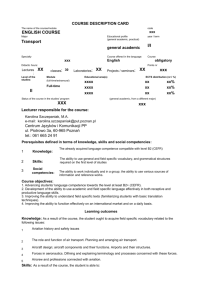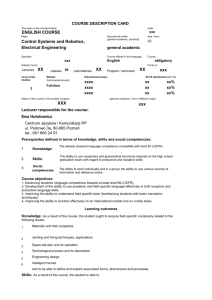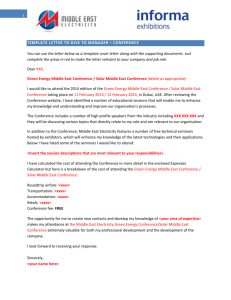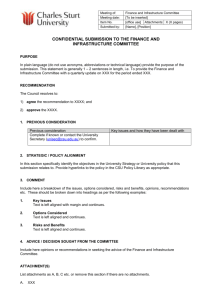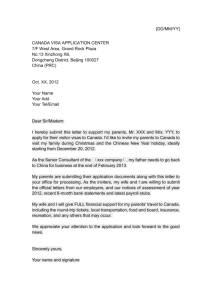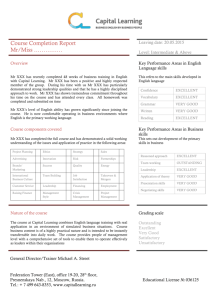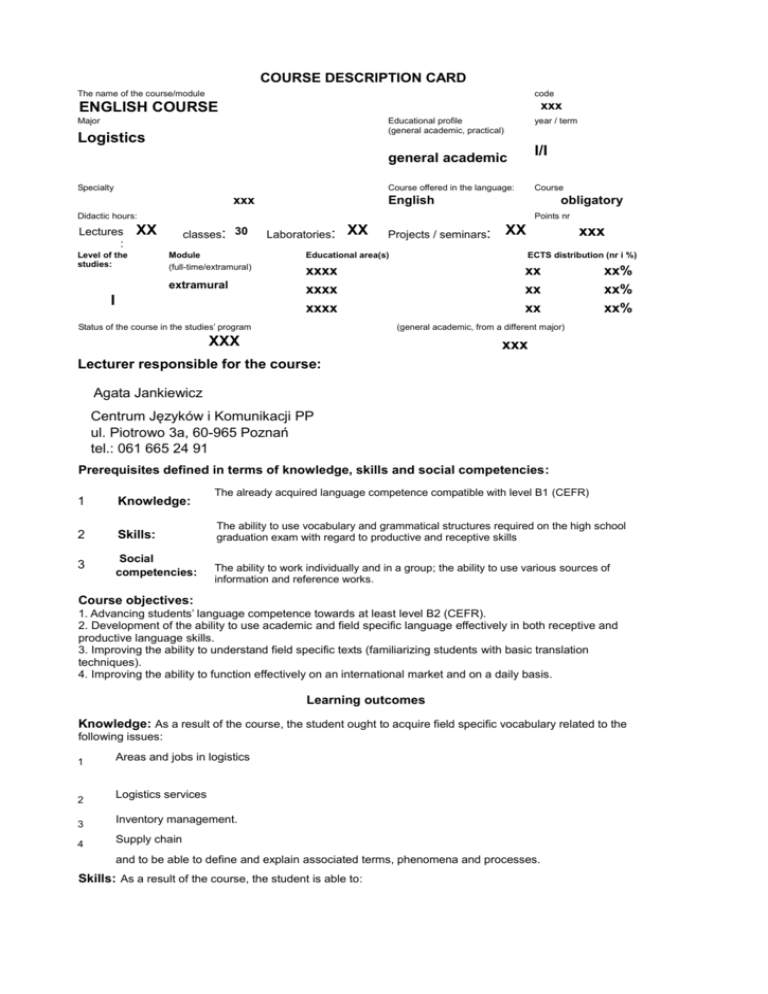
COURSE DESCRIPTION CARD
The name of the course/module
code
xxx
ENGLISH COURSE
Major
Educational profile
(general academic, practical)
Logistics
year / term
I/I
general academic
Specialty
Course offered in the language:
xxx
Course
English
obligatory
Didactic hours:
Lectures
:
Points nr
XX
Level of the
studies:
classes: 30
Module
(full-time/extramural)
extramural
I
Laboratories:
XX
XX
xxx
Educational area(s)
ECTS distribution (nr i %)
xxxx
xxxx
xxxx
xx
xx
xx
Status of the course in the studies’ program
Liczba punktów
Projects / seminars:
xx%
xx%
xx%
(general academic, from a different major)
XXX
xxx
Lecturer responsible for the course:
xx
xxx
Agata Jankiewicz
Centrum Języków i Komunikacji PP
ul. Piotrowo 3a, 60-965 Poznań
tel.: 061 665 24 91
Prerequisites defined in terms of knowledge, skills and social competencies:
1
Knowledge:
2
Skills:
3
Social
competencies:
The already acquired language competence compatible with level B1 (CEFR)
The ability to use vocabulary and grammatical structures required on the high school
graduation exam with regard to productive and receptive skills
The ability to work individually and in a group; the ability to use various sources of
information and reference works.
Course objectives:
1. Advancing students’ language competence towards at least level B2 (CEFR).
2. Development of the ability to use academic and field specific language effectively in both receptive and
productive language skills.
3. Improving the ability to understand field specific texts (familiarizing students with basic translation
techniques).
4. Improving the ability to function effectively on an international market and on a daily basis.
Learning outcomes
Knowledge: As a result of the course, the student ought to acquire field specific vocabulary related to the
following issues:
1
Areas and jobs in logistics
2
Logistics services
3
Inventory management.
4
Supply chain
and to be able to define and explain associated terms, phenomena and processes.
Skills: As a result of the course, the student is able to:
1
give a talk on field specific or popular science topic (in English), and discuss general and field specific
issues using an appropriate linguistic and grammatical repertoire
2
express basic mathematical formulas and to interpret data presented on graphs/diagrams
3
conduct business correspondence in English
Social competencies:
1
As a result of the course, the student is able to communicate effectively in a field specific/professional
area, and to give a successful presentation in English.
2
The student is able to recognize and understand cultural differences in a professional and private
conversation, and in a different cultural environment.
The evaluation methods
Formative assessment:
based on continuous progress assessment
Summative assessment:
student’s preparation for the classes ( quizzes on vocabulary or grammar),
continuous assessment during every class (oral utterances, tests)
partial marking during every class, including teamwork
Additional activity marks for classwork, and in particular for:
discussing extended aspects of a problem
applying effectively new knowledge
Program
In the first semester of an English course syllabus comprises the following topics:
1. Basic mathematical formulas in English. Students are able to name different shapes, figures, angles, triangles
etc. They are able to read and describe equations in English. Presented above material is verified on a written
part of the final exam.
2. Interpretation of data presented on graphs/diagrams. Students learn different types of graphs, charts (line
graph, pie chart, bar/column chart), as well as extensive vocabulary needed for their interpretation. This
knowledge/skill is useful to present different trends in business. Students also use this skill while giving their
presentations, projects. It is also a part of a written part of the final exam.
3. Specific/technical vocabulary:
Introduction to logistics ( areas, jobs and regular activities)
Logistics services
Inventory management
Supply chain
Students learn from their main two course books as well as from additional sources provided by the teacher.
Students analyze technical texts exceeding their knowledge on a particular topic (e.g. internet sources,
additional materials prepared by a teacher) and vocabulary and grammar exercises.
Main literature:
Grussendorf, Marion. 2009. English For Logistics. Oxford: Oxford University Press.
Pilbeam, Adrian, O’Driscoll, Nina. 2010. Market Leader- Logistics Management. Harlow: Pearson Longman.
Supplementary literature:
Matalewska Aleksandra, Matalewski, Marek. 2010. My Logistics. Poznań: Biblioteka Logistyka.
Hanf, Bodo. 2001. Angielski w technice. Wyd. LektorKlett. (Pons).
Grzegożek, Starmach. 2004. English for Environmental Engineering. Kraków.
Kucharska-Raczunas, J., Maciejewska. 2010. English for mathematics for students of technical studies.
Gdańsk.
Student workload
Form of activity
hours
ECTS
Overall expenditure
60
2
Classes requiring an individual contact with the
teacher
30
1
Practical classes
30
1
COURSE DESCRIPTION CARD
The name of the course/module
code
xxx
ENGLISH COURSE
Major
Educational profile
(general academic, practical)
Logistics
year / term
I/II
general academic
Specialty
Course offered in the language:
xxx
Course
English
obligatory
Didactic hours:
Lectures
:
XX
Level of the
studies:
Points nr
classes: 30
Module
(full-time/extramural)
extramural
I
Laboratories:
Projects / seminars:
XX
xxx
Educational area(s)
ECTS distribution (nr i %)
xxxx
xxxx
xxxx
xx
xx
xx
Status of the course in the studies’ program
Liczba punktów
XX
(general academic, from a different major)
XXX
Lecturer responsible for the course:
xx%
xx%
xx%
xxx
xx
xxx
Agata Jankiewicz
Centrum Języków i Komunikacji PP
ul. Piotrowo 3a, 60-965 Poznań
tel.: 061 665 24 91
Prerequisites defined in terms of knowledge, skills and social competencies:
1
Knowledge:
2
Skills:
3
Social
competencies:
The already acquired language competence compatible with level B1 (CEFR)
The ability to use vocabulary and grammatical structures required on the high school
graduation exam with regard to productive and receptive skills
The ability to work individually and in a group; the ability to use various sources of
information and reference works.
Course objectives:
1. Advancing students’ language competence towards at least level B2 (CEFR).
2. Development of the ability to use academic and field specific language effectively in both receptive and
productive language skills.
3. Improving the ability to understand field specific texts (familiarizing students with basic translation
techniques).
4. Improving the ability to function effectively on an international market and on a daily basis.
Learning outcomes
Knowledge: As a result of the course, the student ought to acquire field specific vocabulary related to the
following issues:
1
Modes of transport
2
Transport options; containers
3
Planning and arranging transport
4
Shipping goods
and to be able to define and explain associated terms, phenomena and processes.
Skills: As a result of the course, the student is able to:
1
give a talk on field specific or popular science topic (in English), and discuss general and field specific
issues using an appropriate linguistic and grammatical repertoire
2
express basic mathematical formulas and to interpret data presented on graphs/diagrams
3
conduct business correspondence in English
Social competencies:
1
As a result of the course, the student is able to communicate effectively in a field specific/professional
area, and to give a successful presentation in English.
2
The student is able to recognize and understand cultural differences in a professional and private
conversation, and in a different cultural environment.
The evaluation methods
Formative assessment:
Summative assessment:
based on continuous progress assessment
student’s preparation for the classes ( quizzes on vocabulary or grammar),
continuous assessment during every class (oral utterances, tests)
partial marking during every class, including teamwork
Additional activity marks for classwork, and in particular for:
discussing extended aspects of a problem
applying effectively new knowledge
Program
In the second semester of an English course syllabus comprises the following topics:
1. Topics for oral exam
Discussed topics follow the list of general topics for oral exam required in a particular academic year. Discussed
topics may vary in semesters according to the lecturer and his/her choice. Oral exam topics can be modified or
changed depending on a given academic year.
2. Specific/technical vocabulary:
Modes of transport Internet,
Transport options, containers
Planning and arranging transport
Shipping goods
Students learn from their main two course books as well as from additional sources provided by the teacher.
Students analyze specialist texts exceeding their knowledge on a particular topic (e.g. internet sources,
additional materials prepared by a teacher) and vocabulary and grammar exercises.
Main literature:
Grussendorf, Marion. 2009. English For Logistics. Oxford: Oxford University Press.
Pilbeam, Adrian, O’Driscoll, Nina. 2010. Market Leader- Logistics Management. Harlow: Pearson Longman.
Supplementary literature:
Matalewska Aleksandra, Matalewski, Marek. 2010. My Logistics. Poznań: Biblioteka Logistyka.
Student workload
Form of activity
hours
ECTS
Overall expenditure
60
2
Classes requiring an individual contact with the
teacher
30
1
Practical classes
30
1
COURSE DESCRIPTION CARD
The name of the course/module
code
xxx
ENGLISH COURSE
Major
Educational profile
(general academic, practical)
Logistics
year / term
II/III
general academic
Specialty
Course offered in the language:
xxx
Course
English
obligatory
Didactic hours:
Lectures
:
Level of the
studies:
XX
Points nr
classes: 30
Module
(full-time/extramural)
extramural
I
Laboratories:
XX
Projects / seminars:
XX
xxx
Educational area(s)
ECTS distribution (nr i %)
xxxx
xxxx
xxxx
xx
xx
xx
xx%
xx%
xx%
Status of the course in the studies’ program
Liczba punktów
(general academic, from a different major)
XXX
xxx
Lecturer responsible for the course:
xx
xxx
Agata Jankiewicz
Centrum Języków i Komunikacji PP
ul. Piotrowo 3a, 60-965 Poznań
tel.: 061 665 24 91
Prerequisites defined in terms of knowledge, skills and social competencies:
1
Knowledge:
2
Skills:
3
Social
competencies:
The already acquired language competence compatible with level B1 (CEFR)
The ability to use vocabulary and grammatical structures required on the high school
graduation exam with regard to productive and receptive skills
The ability to work individually and in a group; the ability to use various sources of
information and reference works.
Course objectives:
1. Advancing students’ language competence towards at least level B2 (CEFR).
2. Development of the ability to use academic and field specific language effectively in both receptive and
productive language skills.
3. Improving the ability to understand field specific texts (familiarizing students with basic translation
techniques).
4. Improving the ability to function effectively on an international market and on a daily basis.
Learning outcomes
Knowledge: As a result of the course, the student ought to acquire field specific vocabulary related to the
following issues:
1
Warehousing
2
Storage
3
Transport
4
Distribution ; documentation and finance
and to be able to define and explain associated terms, phenomena and processes.
Skills: As a result of the course, the student is able to:
1
give a talk on field specific or popular science topic (in English), and discuss general and field specific
issues using an appropriate linguistic and grammatical repertoire
2
express basic mathematical formulas and to interpret data presented on graphs/diagrams
3
conduct business correspondence in English
Social competencies:
1
As a result of the course, the student is able to communicate effectively in a field specific/professional
area, and to give a successful presentation in English.
2
The student is able to recognize and understand cultural differences in a professional and private
conversation, and in a different cultural environment.
The evaluation methods
Formative assessment:
based on continuous progress assessment
Summative assessment:
student’s preparation for the classes ( quizzes on vocabulary or grammar),
continuous assessment during every class (oral utterances, tests)
partial marking during every class, including teamwork
additional mark for preparing and giving a presentation, presenting results of a project (teamwork)
final grade from the exam: written and oral part
Additional activity marks for classwork, and in particular for:
discussing extended aspects of a problem
applying effectively new knowledge
the ability to work well in a team while giving a presentation/ discussing team project
Program
In the third semester of an English course syllabus comprises the following topics:
1. Topics for oral exam
Discussed topics follow the list of general topics for oral exam required in a particular academic year. Topics
discussed may vary in semesters according to the lecturer and his/her choice. Oral exam topics can be modified
or changed depending on a given academic year.
2. Specific/technical vocabulary:
Warehousing
Storage
Transport
Distribution ; documentation and finance
Students learn from their main two course books as well as from additional sources provided by the teacher.
Students analyze specialist texts exceeding their knowledge on a particular topic (e.g. internet sources,
additional materials prepared by a teacher) and vocabulary and grammar exercises. Specific/technical
vocabulary is tested on the exam- both written and oral part.
Main literature:
Grussendorf, Marion. 2009. English For Logistics. Oxford: Oxford University Press.
Pilbeam, Adrian, O’Driscoll, Nina. 2010. Market Leader- Logistics Management. Harlow: Pearson Longman.
Supplementary literature:
Matalewska Aleksandra, Matalewski, Marek. 2010. My Logistics. Poznań: Biblioteka Logistyka.
Student workload
Form of activity
hours
ECTS
Overall expenditure
60
2
Classes requiring an individual contact with the
teacher
30
1
Practical classes
30
1

